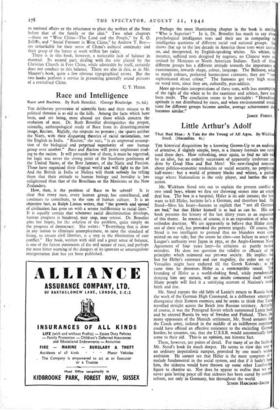Little Arthur's Adolf
THE historical disquisition by a knowing Grown-Up to an eudiena of attentive, if slightly simple, boys, is a literary formula too rarelv used these days. How refreshing, once again, to find no tale told by an idiot, but an orderly succession of apparently irrelevant a done by Good Men and Bad Men! No • new-fangled nonsen about politico-economic tendencies or social security, no perplex half-tones: but a world of primary blacks and whites, a pieba stage where Nationalism is the only player, and battles the onl action.
Mr. Wickham Steed sets out to explain the present conflict two small boys, whom we first see throwing stones into an emp, deal box. The box is a hospital; Hitler is its sole inmate; the bo want to kill Hitler, because he's a German, and therefore bad. Mr Steed—bless his heart—hastens to explain that " not all Germa are bad," but that Hitler himself is as bad as can be. His ne book presents the history of the last thirty years as an expans of this theme. In essence, of course, it is an exposition of what orthodox doctrine. We are apparently to believe that Hider alone out of sheer evil, has provoked the present tragedy. Of course, Steed is too intelligent to pretend that no blunders were co mitted on our side; but the errors he cites—our failure to assert League's authority over Japan in 1931, or the Angio-German Nan Agreement of four years later—he criticises as purely tact' mistakes. He does not question the validity or efficacy of principles which animated our pre-war society. He implies t but for Hitler's existence and our stupidity, the order set up Versailles might have endured till the Greek Kalends: at same time he dismisses Hider as a contemptible rascal. branding of Hitler as a world-shaking fiend, while paradoxi denying him any stature, will no doubt commend itself widd Many people will find it a satisfying account of Nazism's soar birth and rise.
Mr. Steed repeats the old fable of Lenin's return to Russia be the work of the German High Command, in a deliberate attempt disorganise their Eastern enemies; and he seems to think that L travelled straight across the Reich into Russian territory. Actual of course, it was the Petrograd Soviet which summoned Lenin ba and he entered Russia by way of Sweden and Finland. Then, I. many opponents of the Munich settlement, Mr. Steed assumes th the Czech army, isolated in the middle of an indffferent tontine could have offered an effective resistance to the encircling Ge hordes; he assumes, too, that the U.S.S.R. would automatically ha come to their aid. This-is an opinion, not historic fact.
These, however, are points of detail. For many of us the faults Mr. Steed's book lie much deeper. He seems to view this war an ordinary imperialistic rumpus, provoked by one man's wick ambition He cannot see that f-litler is the mere symptom of malady fundamental in the social system, and that if it hadn't him, the sickness would have thrown up some other Lucifer- figure to chastise us. Nor does he appear to realise that we never gain lasting peace till that sickness has been cured by sensib reform, not only in Germany, but throughout the world.
SIMON liAncouirf-Stam


























 Previous page
Previous page